Interview Relay
Stories — Connected Through the Tokyo Marathon
“Power to connect through mutual support”—Bonds between the Volunteers Fostered at the Site of the Tokyo Marathon—
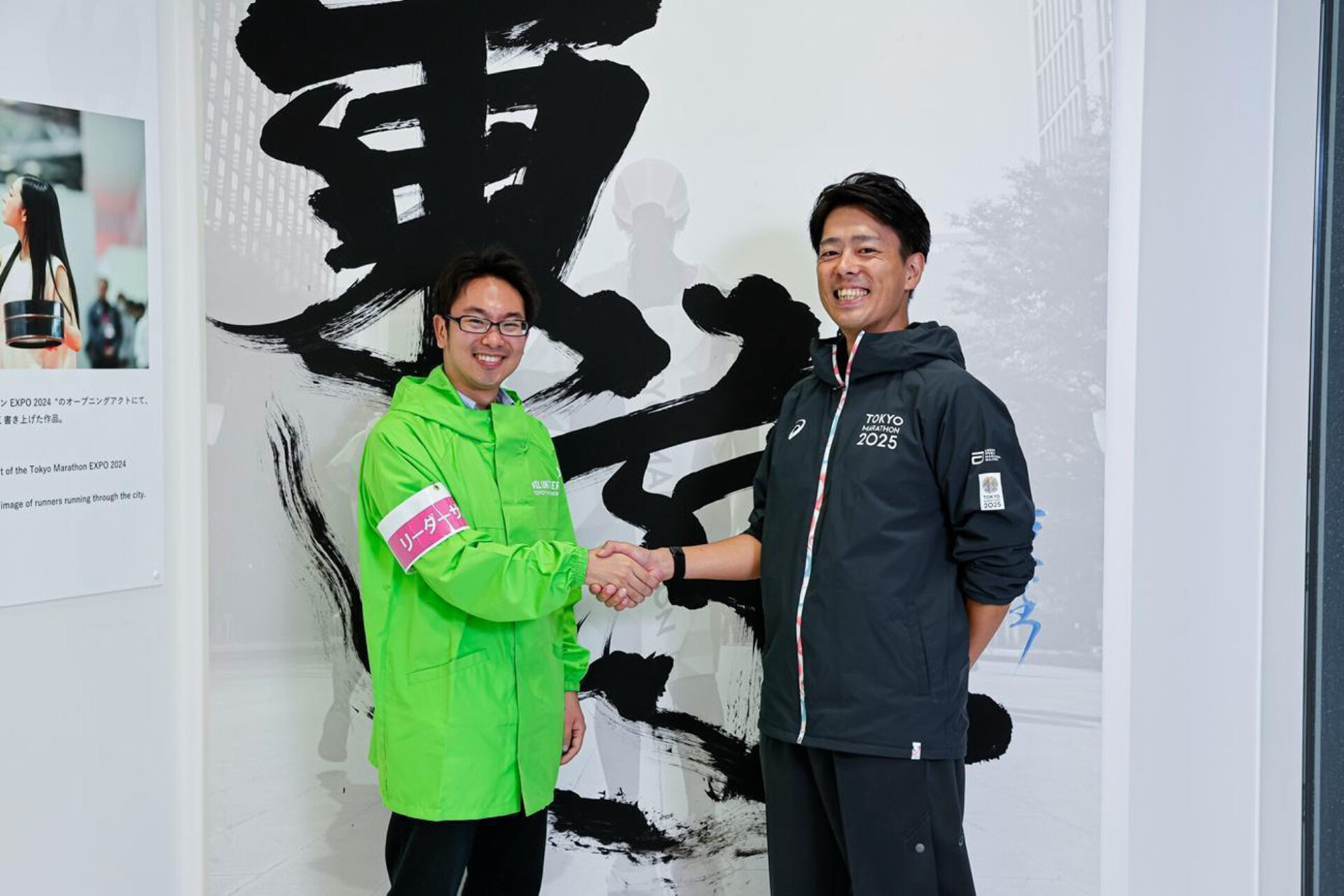
In this interview, we spoke with Mr. Takeshi Oki of the Volunteer Business Department of the Social Contribution Division of the Tokyo Marathon Foundation who is engaging in training volunteers as the person in charge of the VOLUNTAINER Business of the Official Volunteer Club of the Tokyo Marathon and Mr. Shunsuke Akazawa who has participated in the Tokyo Marathon as a volunteer since 2014 and now is playing an active role as Leader Support. They shared a story of a connection born from the volunteer activities of the Tokyo Marathon.
Joined Alone to Volunteer for the First Time, “Just So Much Fun”
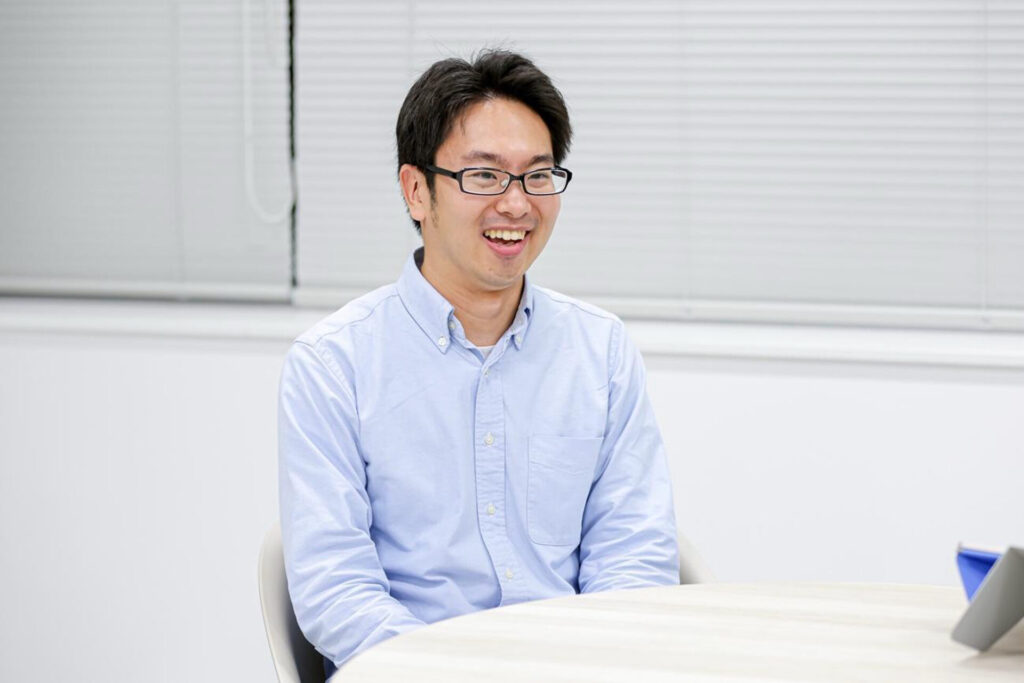
―― First, could you please tell us the role of volunteers and how the system works in the Tokyo Marathon?
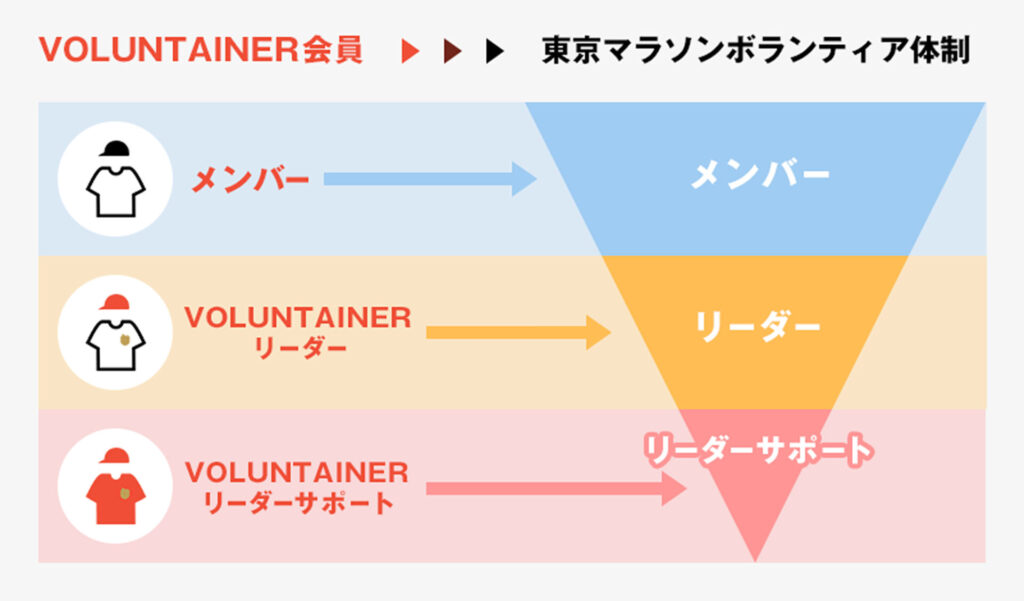
Oki: The volunteer system of the Tokyo Marathon can be divided into three categories: “Volunteer Members” in charge of supporting runners, “Volunteer Leaders” in charge of coordinating such Members and “Leader Support” in charge of coordinating such Leaders. The main volunteer activities include on race day, receiving from runners their bags and guiding them at the start area, providing drinks and managing the course during the race as well as presenting finisher medals and returning bags to the runners at the finish area. In addition, they provide athlete bibs to runners at the Runners’ Check-in of the Tokyo Marathon EXPO.
Akazawa: It was the 2014 race when I first participated as a volunteer. I was in my first year in university. My acquaintance was going to run the Tokyo Marathon, so I wanted to get involved, too, but I was also thinking I couldn’t run! Then, I heard about the volunteer, so this is how I started. It may sound like an impure motive, but I was still a student, so volunteering may turn in my favor in a job search. While I did not know anyone, I just dived into the volunteer work alone.
Oki: You were not concerned about participating in it alone?
Akazawa: Yes, for sure. Until then, I had never volunteered, and that was my first experience. On the day of the event, I went to the site, thinking to myself how would this day turn out? But it was just so much fun. The Leader of the site I was assigned for the first time had an atmosphere of “Anyone is welcome, let’s enjoy” and the Leader treated me like a son. Since then, I have been volunteering at the Tokyo Marathon. The Tokyo Marathon is no less than a festival held once a year. It is addictive, including a sense of exaltation after it ends (laugh), which makes me want to go again.
―― How did you meet each other for the first time?
Oki: I think we met each other for the first time at the VOLUNTEER Leader Support training and selection site five years ago. What did you think of the training, Mr. Akazawa?
Akazawa: I was preoccupied with the selection process of the VOLUNTEER Leader Support. At the lecture and seminar, I realized it again and found it informative. Before the training started, I had thought it would be the selection time, and after it ended, I found it was half selection and half learning time.
Oki: Yes, exactly. Leaders become Leader Support by attending lectures and workshops for half a day, and then conducting simulation training in a conference room to practice coordinating a team. At the time of the Leader Support training session, Mr. Akazawa was young and serious. I was amazed to know that such a young person actually exists in this world! (laugh). A working professional in his fifth or sixth year could have been enjoying other entertainment. I was impressed by your aim to enhance your skills as a sports volunteer further.
Akazawa: Thank you very much (laugh).
Relationship where Operation Side and Volunteer Inspire Each Other to Learn and Improve
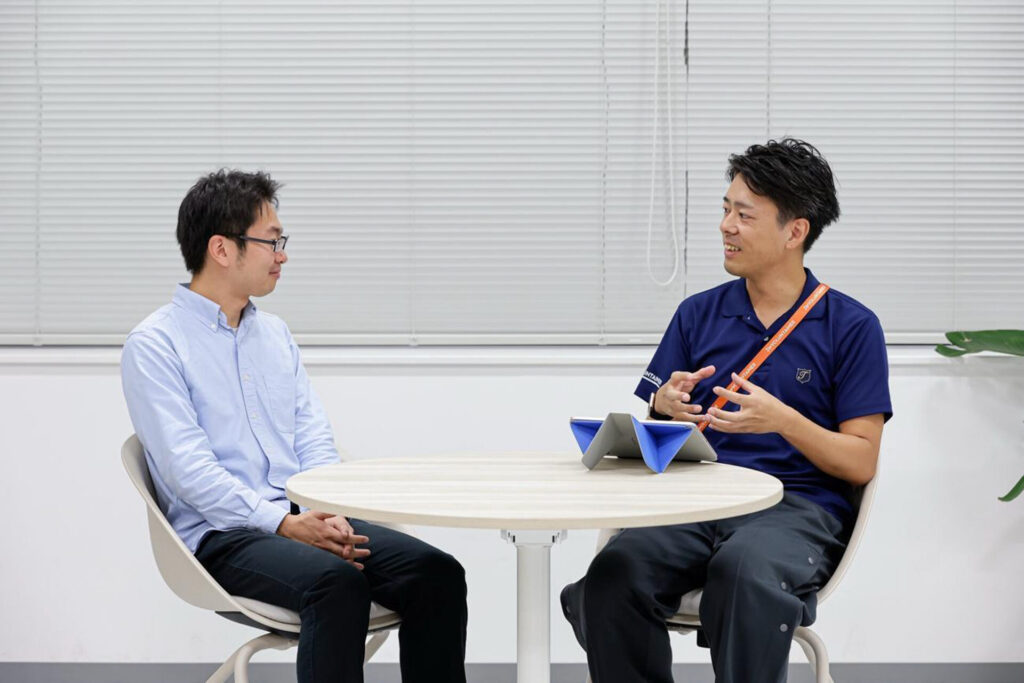
―― Through your volunteer activities with the Tokyo Marathon, have you noticed any changes within yourself, Mr. Akazawa?
Akazawa: The biggest change I’ve noticed is in my leadership skills. I no longer feel any hesitation about stepping forward to lead or facilitate a situation. Also, at the beginning, my motive to continue was just because it was fun, but now I have become a working professional, and at some point in the distant future, I may hold a managerial position, and I start imagining that the experience I have gained as Leader and Leader Support would benefit me at work.
Oki: In terms of communication, what do you talk about with someone you meet for the first time? I find it hard to do so.
Akazawa: In the early days, I did not know anything about marathons, such as rules and what type of event it was, so we mostly talked about practical things, like how to handle our duties on race day. Now that I’ve become a Leader and Leader Support, I focus more on rallying the team, saying things like, “Let’s enjoy this!” or “Let’s do this!” (laughs).
Oki: Wow, since when have you become so passionate?
Akazawa: No, no (laugh). It is now my 12th year of volunteering. Now, many people from younger generations are joining us. At the last Tokyo Marathon, we even had a student team in our block. I told them about what I have done until then and communicated with them through a simple daily conversation like “What do you do normally?” I think I can easily find a conversation starter when I meet someone new.
Oki: From our standpoint as organizers, there is so much we learn from the volunteers. Leaders and Support staff like you, Mr. Akazawa, are active in various events year-round. You absorb ideas—like “this worked well there” or “that was a great concept”—and give us feedback, which is incredibly helpful. Seeing such high aspirations makes me feel that we cannot lose to your enthusiasm for learning. I think a lot about building an organization that is worthy of you all. You come to us giving 100%, so if we don’t return 100% or more, you might not come back next year.
Akazawa: Are you okay? I hope we aren’t putting too much pressure on you!
Oki: Oh yes, you’re (laugh). I’m having stabbing pains in my stomach… no, I am just kidding. But truly, if we don’t match the high motivation of people like you, I’d feel terrible. That high level of motivation is a spirit cultivated by the Volunteer Center members over the past 20 years of the Tokyo Marathon, and it has been passed down to new generations like yours. We can’t be the ones left behind. I feel strongly that we cannot let this volunteer culture die out on our watch.
Positive Effects from Bright Spirit of Volunteers to the Society
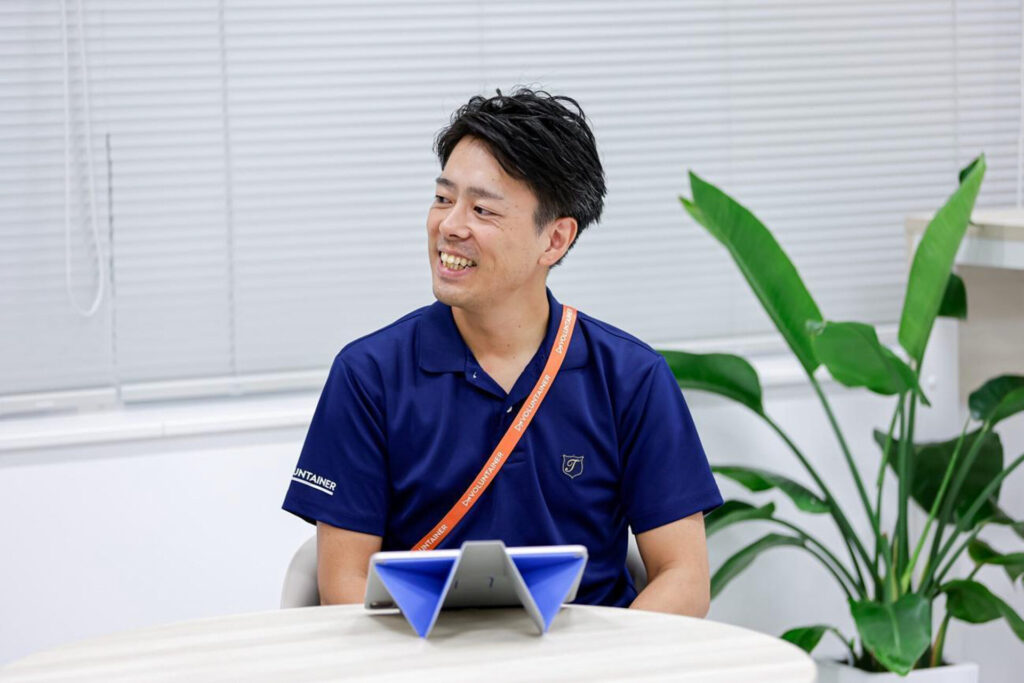
――What are the aspects you find interesting and appealing, unique to the volunteers of the Tokyo Marathon?
Akazawa: Without a doubt, it’s the “people.” It is fascinating to hear stories from such a diverse range of individuals—from veterans who have been volunteering since the very first Tokyo Marathon to those who have only recently become Leaders or Leader Support. It’s been a huge learning experience for me. I have been following in the footsteps of these mentors, and I’ve learned so much over the past 12 years. This might sound strange to say, but the Leaders and Leader Support staff… they actually enjoy the unexpected.
Oki: Ah yes, you may be right. There is definitely a part of us that gets a bit restless, almost hoping something happens so we can solve it! (laughs)
Akazawa: I never had that mindset before. The positivity, the brightness, and the power to turn any situation into something fun is just amazing. I face plenty of difficulties in my day job, but learning that shift in perspective—how to flip a situation around—has had a huge influence on me.
――In your opinion, what kind of impact do the volunteers of the Tokyo Marathon or the VOLUNTAINER as an organization have on the city of Tokyo and society?
Oki: I often think that the presence of volunteers like Mr. Akazawa would make society much brighter. I think that certain people may feel annoyed if a marathon is held in the town where they live. But, because the volunteers engage pleasantly in the activities with a good impression, the people surrounding them resonate. I think that is exactly why we have been able to hold this event nearly 20 times successfully.
Hope to Increase Opportunities for Children to Participate In
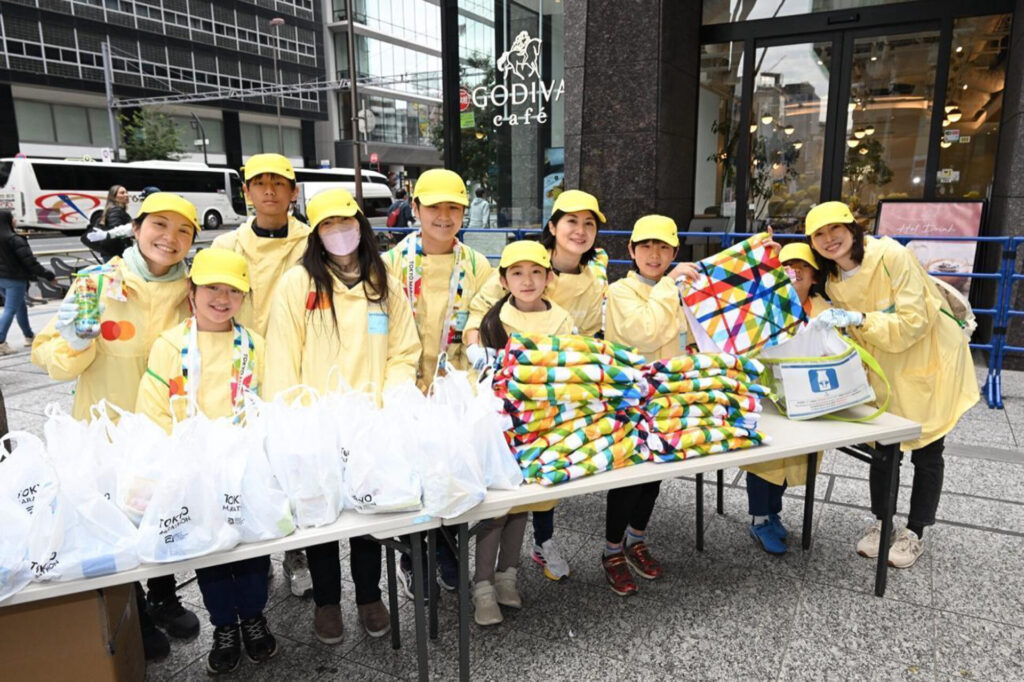
――About the future VOLUNTAINER, is there anything that you envision?
Oki: Now, in certain areas in the Tokyo Marathon, we have a program where elementary and junior high school students can volunteer alongside their parents. For instance, there are scenes of handing a runner a cup at a water station or giving a high-five, and for children, such actions may be embarrassing or require a lot of courage. But when they see the adult volunteers next to them cheering energetically, the children may want to try extending their arms, and if they can actually slap a high five with the runners, it will turn into a wonderful experience.
I believe that having volunteers gently encourage those children’s first steps will spark their interest in volunteering in the future. Even in the volunteer activities organized by local communities, children with such experience may take an initiative. I have become more aware of such expansion recently.
Akazawa: I find it incredible how the Tokyo Marathon becomes a place and an opportunity for children to engage with society proactively. The presence of children naturally adds a bright spirit and changes the atmosphere on site. How they work hard motivates other volunteers and runners.
Oki: That’s right. From a runner’s perspective, when children are cheering, you want to wave back, no matter how exhausted you are. That is why I want to increase the opportunities for children to get involved throughout the event. If they come back as Leaders or Leader Support when they are high school or college students, it would create a truly beautiful cycle.
We Answer Your Questions: “Real Talk—What’s Volunteering Actually Like?”
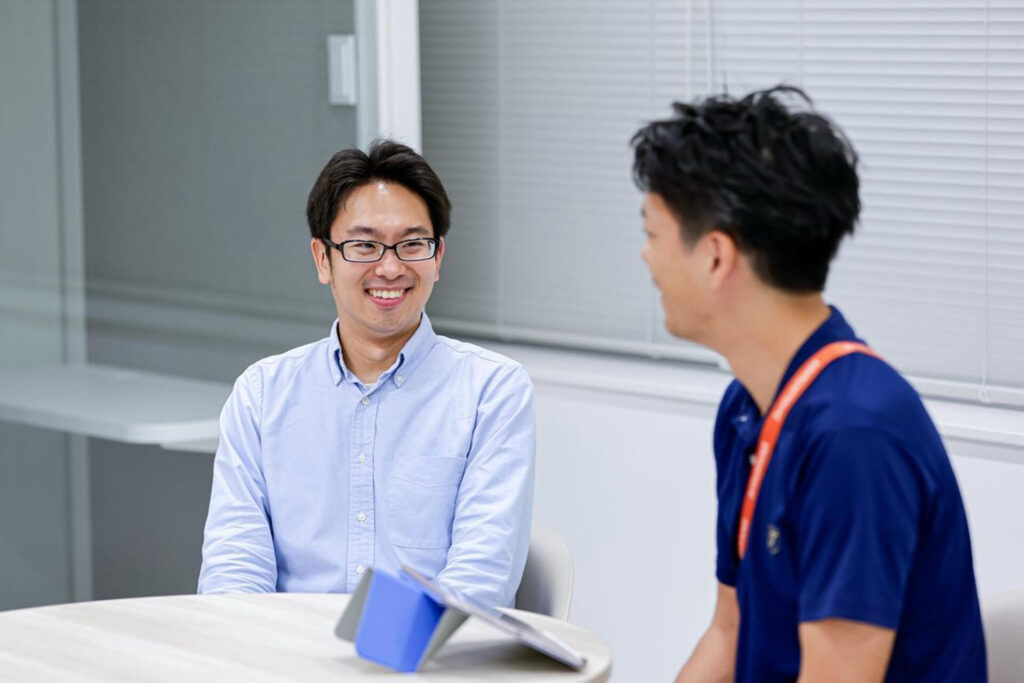
――Speaking of younger generations, the Tokyo Marathon Foundation has apparently received many questions asking for the “unvarnished truth” about volunteering.
Oki: Yes, that’s right. I’ve picked out a few of them to ask Mr. Akazawa. First up, the one everyone is curious about: “Does volunteering help with job hunting?” Is this true?
Akazawa: I think it depends on the person. I’ve heard that non-Japanese companies often have a specific section on resumes for volunteer experience, though I’m not sure about Japanese companies. However, when I changed jobs, I made sure to write “Leadership Experience” on my CV (laughs). It might have caught the recruiter’s eye or served as a good self-promotion point. I don’t think it directly determines if you pass or fail, but the interviewer might be a runner, so it can definitely be a great conversation starter.
Oki: I see. Next question: “I was planning to participate for the first time, but I’m getting anxious and feel like cancelling… Will a first-timer feel out of place?” How would you encourage someone feeling this way?
Akazawa: Even if it is your first time, you will not be out of place (laugh). Quite the opposite—you are incredibly welcome.I just want to say: Just get yourself to the meeting spot! Once you’re there, we will do everything we can to make sure you have a great time. Leaders usually start by asking, “Is this your first time?” If you say yes, they will support you every step of the way. The experienced members around you will also teach you how to enjoy the day, so please don’t worry.
Oki: Another question is “recently, the number of runners from overseas has increased in the Tokyo Marathon. Is it better if I can speak a foreign language?”
Akazawa: It is not any problem even if you do not speak any foreign language. However, if you can speak even a little, you might have double the fun. For English, basic school-level words are plenty. You don’t need perfect sentences; just a few words are enough to connect.
Oki: This is the last “Real Talk” question: “I spent my high school and college years during the COVID pandemic, so I’m anxious about real-life social interactions. I’m also worried about communicating with older people. Will I be okay?”
Akazawa: Actually, I would like such young people to come to volunteer. I think your impression will change once you meet people face-to-face. Just because you haven’t had many opportunities for in-person interaction doesn’t mean you need to be negative about it. Young volunteers stand out in a good way, so if I were there, I’d probably come over and start chatting with you immediately! (laughs)
Oki: Yes, that sounds exactly like something you’d do.
Akazawa: We are a group of people with big hearts and welcome new joiners, so we want you to come and join us feeling at ease. In addition, when we ask volunteers about their profession, some occasionally hold surprising positions. It will give you a great opportunity to meet someone you will not get to meet from peer friendship and it will also be a great networking opportunity.
Oki: Just like you said, as a student, you usually only interact with people within 3 or 4 years of your own age. But once you enter the workforce, you suddenly have to talk to people of all generations. Volunteering is a great training ground for the communication skills society requires. I really hope students see that as a major benefit.
The Tokyo Marathon is a Once-a-Year Festival! Feel Free to Just Drop By.
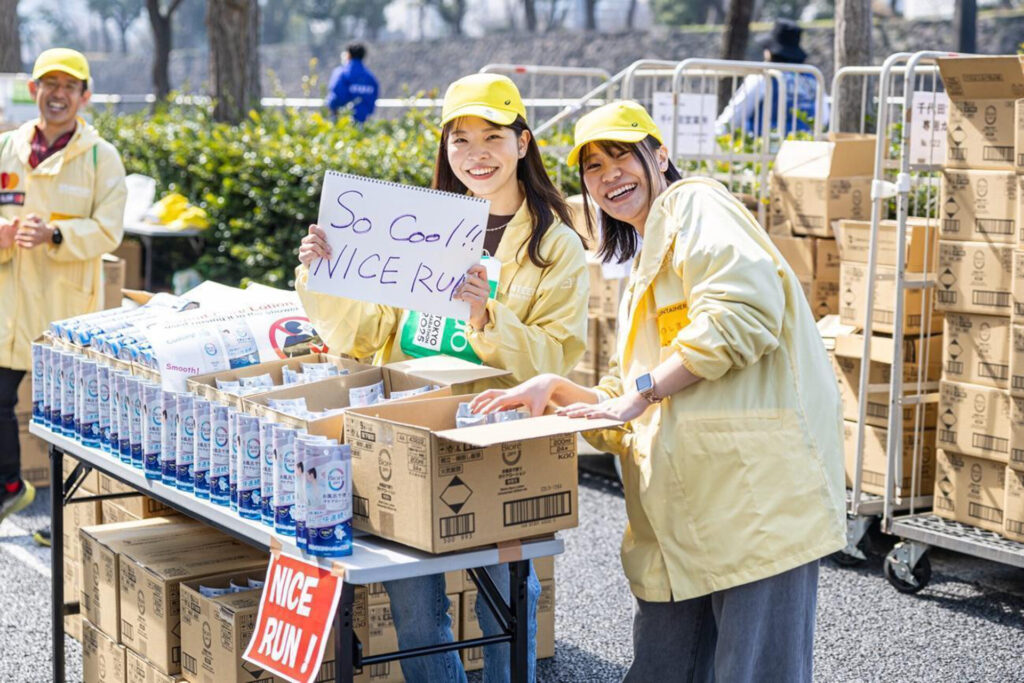
――Finally, could you share a message for anyone thinking about volunteering in the future?
Akazawa: In any case, we hope you just try it once. There are so many things you do not know, and you may think a mysterious world is out there. But you will feel a sense of exaltation that you are part of an enormous event. You will gain confidence by participating in an event that closes the main artery of Tokyo. So feel free to just drop by!
Oki: I think the true significance and value of volunteers is something you can’t fully understand from the outside. To a bystander, it might look like you are just standing there in a cap and jacket, handing out water. But from the perspective of the runners and the organizers, those actions are noble. Without someone to hand out water, a runner might collapse. Without a cheer, a runner might feel they are just running 42km alone. Because a volunteer takes action, “just running” becomes a “Marathon.” Through my conversation with Mr. Akazawa today, I realized that this is the volunteer’s greatest role. I hope we can convey that feeling to everyone.
Akazawa: I recall there are so many runners who say “Thank you!” as they run past, and it is genuinely moving. This is a festival held once a year. I hope as many people as possible can taste this emotion. It is an experience that goes beyond your imagination—something different from a part-time job or regular work.
*Click here to learn more about VOLUNTAINER, the Tokyo Marathon Foundation Official Volunteer Club “a VOLUNTEER is an ENTERTAINER” Come on, let’s take that step forward together! Go further!! From Tokyo to the World!!!

